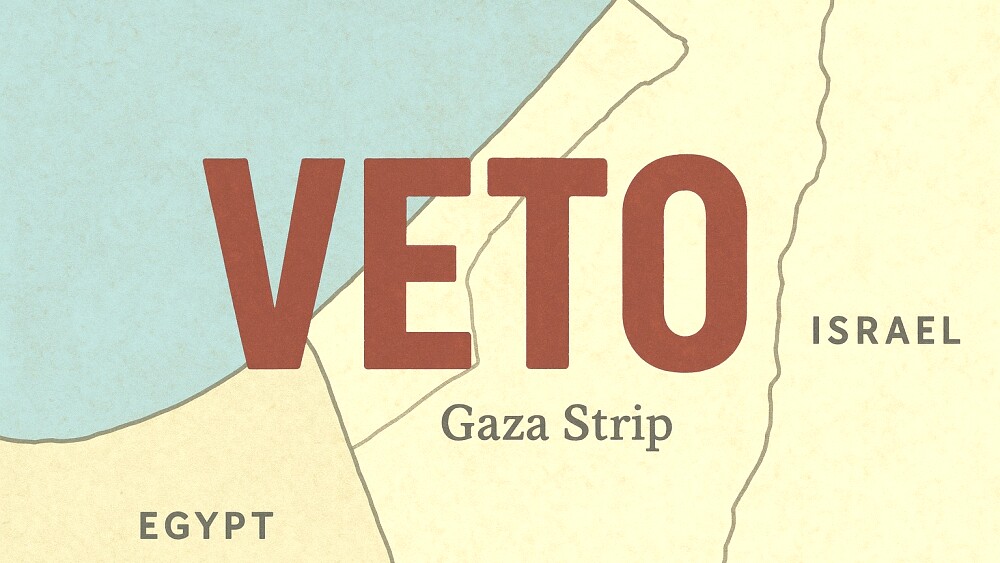In early November 2025 the United States circulated a draft U.N. resolution proposing an international stabilization force for Gaza and a transitional governance framework to follow the ceasefire.
The plan-framed as a two-year “stabilization” mission, with responsibilities from border security to training a Palestinian Arab police force-may sound like a sensible compromise to diplomats in conference rooms. In practice, it would tie Israel’s hands at the very moment it needs sovereign control over its security decisions.
Prime Minister Benjamin Netanyahu and senior ministers have made clear that Jerusalem will determine which foreign contingents are acceptable and which are categorically not.
Israel’s opposition is not mere reflex.
Prime Minister Benjamin Netanyahu and senior ministers have made clear that Jerusalem will determine which foreign contingents are acceptable and which are categorically not. That is not obstructionism - it’s the only rational posture for a country that has been fighting an existential ideological war with Hamas for decades. The proposal circulating at the U.N. envisages troop contributions from a range of states; without Israeli assent, however, those troops could become liabilities rather than guarantors of peace.
There are three practical reasons Israel must veto or otherwise block any deployment it cannot fully control.
First: trust and provenance matter. A “multinational” force is only as neutral as its contributors and commanders. Some of the nations discussed as potential contributors-powers with anti-Israel rhetoric or ambiguous ties to Islamist movements-cannot be assumed impartial. Allowing foreign contingents from states that publicly criticized Israel’s defensive measures, or that maintain close ties to actors hostile to Israel, would create intelligence seams and operational constraints that terrorists would exploit.
Israel cannot be expected to share sensitive security information or cede de facto control over border security to nations the Israeli public and leadership fundamentally distrust.
Second: history warns loudly. Regional “stabilization” and peacekeeping missions have a tragic track record when they lack clear enforcement authority and local legitimacy. UN and multinational operations in Lebanon, Sinai, and elsewhere have failed to prevent rearmament, cross-border terrorism, and the resurgence of militias.
A stabilization mission without Israeli-approved command-and-control safeguards would be a recipe for a permanent security gray zone along Israel’s border.
The risk is not theoretical: a weakly mandated international force that cannot or will not act decisively would simply become a fixed obstacle between Israeli forces and the very militants an operation claims to neutralize. The result would be paralysis dressed up as internationalism.
Third: the operational details remain dangerously vague. The U.S. draft and subsequent reporting mention a “Board of Peace,” a technocratic transitional administration, and timelines-but they are thin on command structures, vetting standards, intelligence-sharing protocols, and who guarantees enforcement if checkpoints are breached or weapons remobilized.
A stabilization mission without Israeli-approved command-and-control safeguards would be a recipe for a permanent security gray zone along Israel’s border.
That does not mean Gaza should be left to chaos:
It means the architecture of security must flow from Israeli operational imperatives, not from a well-meaning but potentially hostile international bureaucracy.
Anything less risks substituting international illusions for real security-and that would be neither peace nor justice for Israel.
Reconstruction, humanitarian aid, and civil administration can and should involve international assistance and oversight-financial donors, NGOs, and technical agencies are indispensable for rebuilding. But the security backbone that prevents the reconstitution of Hamas-style militias must be anchored to those who bear the burden of preventing attacks: Israel, in close coordination with trusted regional partners, such as Abraham Accord signators, not global contenders or countries pretending friendship while allowing weapons smuggling into israel, and those with political axes to grind.
If the U.N. or any external actor seeks to help Gaza recover, they must do so on terms that respect Israel’s fundamental right to defend itself. That requires clear, enforceable safeguards, contributors acceptable to Israel, and a command structure that eliminates intelligence gaps rather than creating them. Anything less risks substituting international illusions for real security-and that would be neither peace nor justice for Israel.
Published originally on November 11, 2025, under the title “Why Israel Must Veto Foreign Forces in Gaza.”







